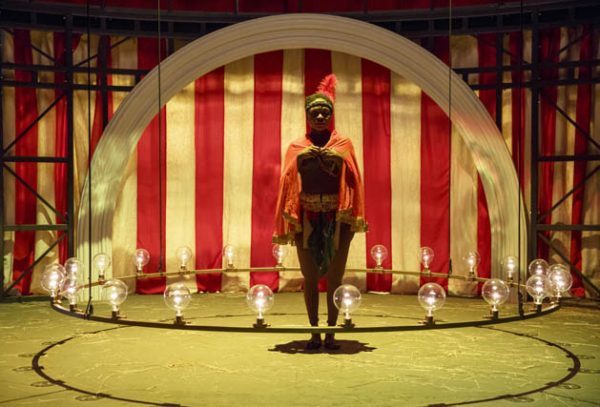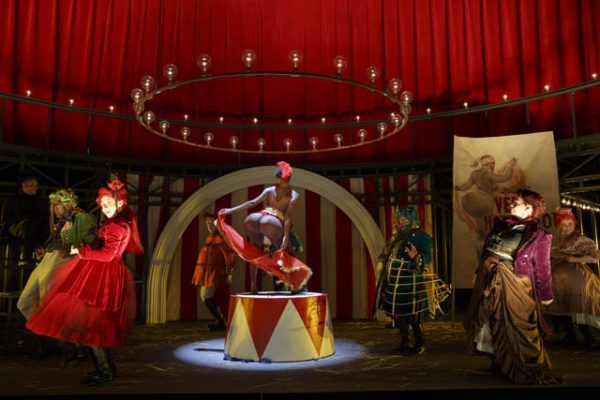
Saartjie Baartman (Zainab Jah) is put on display as the Venus Hottentot in Signature revival of Suzan-Lori Parks drama (photo by Joan Marcus)
The Pershing Square Signature Center
The Irene Diamond Stage
480 West 42nd St. between Tenth & Eleventh Aves.
Tuesday-Sunday through June 4, $30
212-244-7529
www.signaturetheatre.org
Pulitzer Prize–winning playwright Suzan-Lori Parks follows up her powerful Signature revival of the intensely stylized The Death of the Last Black Man in the Whole Entire World AKA the Negro Book of the Dead with a disappointing, heavily overstylized production of her 1996 work, Venus, which opened last night at the Signature’s Irene Diamond Stage. In the play, which continues through June 4, Parks details the horrible abuse suffered by Saartjie Baartman (Zainab Jah), a young South African woman who is chosen by two brothers (John Ellison Conlee and Randy Danson) to be taken to England and displayed as a freak because of her unusually shaped buttocks. Although the Negro Resurrectionist (Kevin Mambo), who serves as ringmaster and narrator, announces the scenes in reverse order, the story is told chronologically, except for the very beginning, in which all the characters are introduced, including Saartjie, the Venus Hottentot, who says, “I regret to inform you that thuh Venus Hottentot iz dead. There wont b inny show tuhnite.” The Resurrectionist adds, “Tail end of our tale for there must be an end is that Venus, Black Goddess, was shameles, she sinned or else completely unknowing of r godfearin ways she stood totally naked in her iron cage. . . . Sheed a soul which iz mounted on Heaven’s bright wall while her flesh has been pickled in Sciences Hall.” Parks fashions much wordplay regarding the buttocks as the rear “end,” highlighting how black bodies are seen as objects unto themselves, not part of a living, breathing human being. Promised that she will be the “African Dancing Princess” getting paid in gold over a two-year period, Saartjie accepts the brothers’ offer to go to England. There she joins a downtrodden troupe, the 8 Human Wonders, freaks who are being taken advantage of first by the two brothers, then by the Mother-Showman (Danson), who allows curious onlookers to fondle Saartjie for an additional price. Meanwhile, a play-within-a-play, the baroque period piece For the Love of the Venus, mimics what is happening to Saartjie, in a more elegant manner. Her life changes dramatically when she is taken in by the Baron Docteur (Conlee), who claims to be in love with her while also using her as a specimen for the 8 Anatomists, but it is already clear that things are not going to go well for Saartjie.

Saartjie Baartman (Zainab Jah) dreams of a better life where the streets are paved with gold in Venus (photo by Joan Marcus)
Venus opens with Jah (Eclipsed) being placed in a tight-fitting naked suit that exaggerates her body, particularly her buttocks; it’s an emotional moment, as if she is on view for us not unlike Saartjie was two hundred years ago, after slavery had been banned in England. (It also evokes the beginning of Bernard Pomerance’s The Elephant Man.) Jah is superb as the Venus Hottentot, who believes that a great life awaits her no matter how terribly she is treated. Mambo (The Color Purple) and Conlee, as the Baron Docteur, are fine as well, but the rest of the cast, including several who were in The Death of the Last Black Man, are like amateurish caricatures, which might be the point but it detracts from the narrative nonetheless. Parks (Topdog/Underdog, Father Comes Home from the Wars) and Obie-winning Public Theater Public Works artistic director deBessonet (Good Person of Szechwan) get to the heart of the matter early on; the bulk of the two-hour and fifteen-minute protest play merely hammers home the same ideas about gender, race, and cruelty, aspects of humanity still prevalent today. Even during intermission, the Baron Docteur delivers his scientific notes on the Hottentot, as if Parks just can’t stop emphasizing the details, which are of course critical but create stagnant, repetitive drama. Matt Saunders’s sets change from the freak-show circus to the Baron Docteur’s bedroom, which features a cleverly placed mirror that reflects Saartjie’s image in a way that reminds us that she is always on view, even in her most intimate of moments. It’s a deft touch in a play that does not have much subtlety and feels like it’s preaching to the choir, a very different experience than The Death of the Last Black Man, a beguiling seventy-five-minute piece that made many of the same arguments with a more abstract depth. Perhaps the Black Lives Matter movement and such books as Ta-Nehisi Coates’s Between the World and Me, which focus on the mistreatment of black bodies in today’s society, have taken some of the potency out of Parks’s play. Parks’s Residency One at Signature will continue in late August with The Red Letter Plays: Fucking A and The Red Letter Plays: In the Blood, presented together for the first time. The May 20 performance of Venus will be followed by the World of the Play talk “Body/Image: Creating and Maintaining Intersectionality in the Arts,” and the May 25 show will be preceded by a Backstage Pass discussion with costume designer Emilio Sosa.